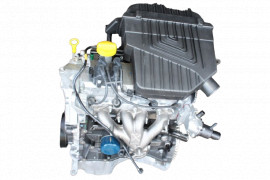Enhancing Your Car's Performance with Import Engines
Enhancing Your Car's Performance with Import Engines
Blog Article
A Detailed Comparison of Different Types of Import Engines and Their Applications in Numerous Autos
From the effectiveness of turbocharged engines to the environmental kindness of electrical powertrains, the spectrum of import engines readily available in today's market provides to a broad array of driving choices and demands. Whether it's the torque of a diesel engine or the non-traditional design of a rotating engine, comprehending the subtleties of each kind and how they align with details automobile requirements can significantly affect performance, gas economy, and general driving experience.
Turbocharged Engines
Turbocharged engines, recognized for their capability to boost power output successfully, have come to be progressively widespread in contemporary car layouts. By using exhaust gases to drive a generator that compresses inbound air into the engine, turbochargers successfully increase the quantity of air and fuel mix that can be ignited, resulting in enhanced efficiency without considerably raising engine size. This innovation allows makers to scale down engines, resulting in far better gas effectiveness while keeping power degrees similar to larger, naturally aspirated engines.

Hybrid Engines
With the advancements in engine modern technology assisting in boosted efficiency and effectiveness, the automobile industry has seen a surge in the assimilation of hybrid engines as a sustainable service for power delivery. Hybrid engines incorporate the advantages of both inner burning engines and electric motors to offer improved gas effectiveness and minimized emissions. By flawlessly switching over in between the two source of power or using them all at once, hybrid engines use adaptability in various driving problems.

Additionally, hybrid technology is not limited to a specific automobile type, with applications varying from compact cars to larger SUVs and also high-performance cars. As ecological worries and gas effectiveness laws end up being significantly popular, hybrid engines represent a significant step in the direction of sustainable transportation remedies.
Electric Engines
Electric engines have reinvented the automotive market with their effective and environmentally-friendly power delivery systems. import engines. These engines run by transforming electrical energy right into power, providing a quiet and smooth driving experience. Unlike conventional combustion engines, electrical engines produce absolutely no tailpipe emissions, decreasing the overall carbon footprint of automobiles and aiding combat air contamination
One of the crucial advantages of electric engines is their high power efficiency, commonly converting over 80% of the electrical energy into propulsion. This performance click here for more converts into cost savings for consumers with minimized gas expenditures. Additionally, electric engines need less maintenance compared to interior burning engines, as they have less relocating components that can break over time.
Electric engines are commonly made use of in electrical lorries (EVs) and crossbreed electrical lorries (HEVs) EVs count exclusively on electrical engines for propulsion, attracting power from rechargeable batteries. On the various other hand, HEVs integrate electrical engines with standard interior combustion engines to optimize fuel efficiency and decrease emissions. The flexibility and sustainability of electric engines make them a promising solution for the future of transport.
Diesel Motor
Diesel motor are renowned for their extraordinary gas performance and durable performance in a range of auto applications. These engines run by pressing air in the cylinders, which results in high temperatures that spark the infused gasoline without the demand for ignition system. This combustion method offers diesel engines with higher torque outcomes compared to gasoline engines, making them optimal for durable cars like vehicles, buses, and construction equipment.
Among the essential advantages of diesel engines is their exceptional gas effectiveness, as they can travel farther on a gallon of fuel contrasted to fuel engines. This performance is specifically valuable for long-haul transport and business fleets, where decreasing fuel costs is a significant factor. In addition, diesel motor are understood for their toughness and durability, needing much less maintenance over their lifespan contrasted to fuel engines.
Recently, developments in diesel engine modern technology have actually likewise focused on minimizing discharges to meet rigorous environmental regulations. Modern diesel motor are furnished with sophisticated emissions regulate systems, such as diesel particulate filters and discerning catalytic decrease, which help decrease contaminants released right into the atmosphere - import engines. These growths have made diesel motors cleaner and more eco pleasant while retaining their performance and performance features
Rotary Engines
Popular for their special style and efficiency qualities, rotating engines supply a distinct option to standard burning engine technologies like diesel engines. These engines, likewise understood as Wankel engines, run on a various concept compared to conventional piston engines.

Final Thought
Finally, the comparison of various kinds of import engines highlights the diversity of options available for numerous automobiles. Turbocharged engines use raised power and performance, hybrid engines combine typical and electrical source of power for improved gas economic situation, electrical engines give a tidy and sustainable choice, diesel engines are recognized for their longevity and torque, and rotating engines offer an one-of-a-kind style with possibility for high efficiency. Each engine kind has its own staminas and applications in the automotive sector.
Furthermore, hybrid engines add to a quieter driving experience and typically provide a smoother velocity compared to standard interior combustion engines.
Distinguished for their unique style and efficiency qualities, rotating engines provide a distinctive alternative to standard combustion engine modern technologies like diesel engines. These engines, also understood as Wankel engines, run on a different principle contrasted to conventional piston engines. In spite of these constraints, rotary engines proceed to draw in makers and enthusiasts looking for a different engine modern technology with distinctive benefits.
Turbocharged engines offer boosted power and performance, crossbreed engines incorporate electric and conventional power sources for enhanced gas economy, electrical engines provide a tidy and lasting alternative, diesel engines are recognized for their resilience and torque, and rotating engines offer a distinct style with capacity for high efficiency.
Report this page